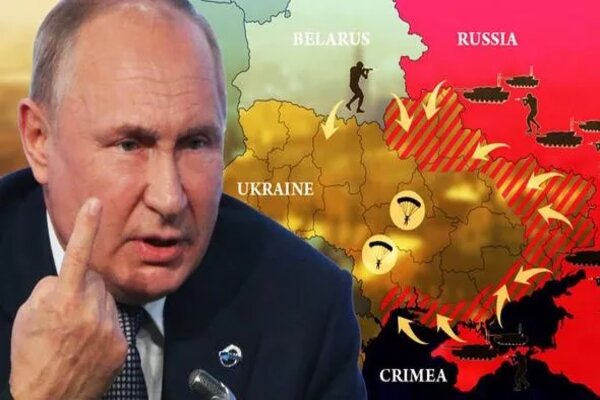Vladimir Putin, Russia’s longtime leader, once described the collapse of the Soviet Union, the predecessor state of Moscow, as the greatest geopolitical catastrophe of the country. “As for the Russian people, it became a genuine tragedy. Tens of millions of our fellow citizens and countrymen found themselves beyond the fringes of Russian territory, the Russian President said in 2005, when Ukraine’s anti-Russian pro-EU Orange Revolution was raging across the country.
Putin was not happy about the new reality of former Soviet republics like Ukraine parting their ways from Moscow. But he was equally perturbed that millions of Russian-speaking people were left behind, stuck in countries like Ukraine, Lithuania and Kazakhstan under non-Russian states.
Putin and his predecessors were still keen on tightening their control over the Russian autonomous regions populated by non-Russian ethnic groups, from Chechnya to Tatarstan and others. They even waged brutal wars to crush separatist movements like the one led by Chechens two decades ago.
Ukraine’s move toward the Western bloc in the name of having a democratic state has made the Russian establishment feel betrayed because Kiev’s national identity and history is much more linked to Russia than Turkic states in Central Asia and Baltic states in eastern Europe, which were also part of the Soviets.
Moscow’s ruling establishment feels so emotional because the first Russian state called Kievan Rus was established in Kiev 12 centuries ago. Even the name of Russia originated in the name of this loose confederation of Eastern Slavic, Baltic and Finnic nations.
Family ties. Russia and Ukraine have strong familial bonds that go back centuries. Kyiv, Ukraine’s capital is sometimes referred to as “the mother of Russian cities,” on par in terms of cultural influence with Moscow and St. Petersburg. It was in Kyiv in the eighth and ninth centuries that Christianity was brought from Byzantium to the Slavic peoples. And it was Christianity that served as the anchor for Kievan Rulers, the early Slavic state from which modern Russians, Ukrainians, and Belarussians draw their lineage.
Historical ties. Russia has deep cultural, economic, and pol bonds with Ukraine, and in many ways Ukraine is central to Russia’s identity and vision for itself in the world.
Russian diaspora Among Russia’s top concerns is the welfare of the approximately eight million ethnic Russians living in Ukraine, according to a 2001 census, mostly in the South and East. Moscow claimed a duty to protect these people as a pretext for its actions in Ukraine.
Crimea Soviet leader Nikita Khrushchev transferred Crimea from Russia to Ukraine in 1954 to strengthen the “brotherly ties between the Ukrainian and Russian peoples.” However, since the fall of the USSR, many Russian nationalists in both Russia and Crimea have longed for a return of the peninsula. The city of Sevastopol is home port for Russia’s Black Sea Fleet, the dominant maritime force in the region.
Trade. Russia was for a long time Ukraine’s largest trading partner, although this link has withered dramatically in recent years. China now tops Russia in its trade with Ukraine. Prior to its invasion of Crimea, Russia had hoped to pull Ukraine into its single market, the Eurasian Economic Union, which today incldes Armenia, Belarus, Kazakhstan, and Kyrgyzstan.
Energy. Russia has relied on Ukrainian pipelines to pump its gas to customers in Central and Eastern Europe for decades, and it continues to pay billions of dollars per year in transit fees to Kyiv. However, in mid-2021, Russia completed construction of its Nord Stream 2 pipeline, which runs under the Baltic Sea to Germany. Although Russia is to keep moving gas through Ukraine for several more years, some critics in the United States and Europe warn that Nord Stream 2 will allow Russia to bypass Ukrainian pipelines if it wants and gain greater geopolitical leverage in the region.
Political sway. Russia has been intent on preserving its political influence in Ukraine and throughout the former Soviet Union, particularly after its preferred candidate for Ukrainian president in 2004, Viktor Yanukovych, lost to a reformist competitor as part of the Orange Revolution popular movement. The shock in Ukraine came after a similar electoral defeat for the Kremlin in Georgia in 2003, known as the Rose Revolution, and was followed by another—the Tulip Revolution—in Kyrgyzstan in 2005. Yanukovych later became president of Ukraine, in 2010, amid voter discontent with the Orange government.
NATO’s focus on Ukraine Russia is not happy with efforts by the US and EU to induct Ukraine into the US-led military alliance of NATO and keep it out of Russian control. Ukraine acts a crucial buffer between Russia. Russia views the growing attentnion for Ukraine from NATO – in terms of weaponry, training and personnel as a threat to its own security.
- In Oct 18, Ukraine joined the United States and seven other North Atlantic Treaty Organization (NATO) countries in a series of large-scale Air Exercise in Western Ukraine.
- It has also accused Ukraine of boosting its own troops numbers in preparation for an attempt to retake the Donbas region, an allegation Ukraine has denied.
Super power image. After the Soviet collapse, many Russian politicians viewed the divorce with Ukraine as a mistake of history and a threat to Russia’s standing as a great power. Losing a permanent hold on Ukraine, and letting it fall into the Western orbit, was seen by many as a major blow to Russia’s international prestige. Russia’s intervention in Ukraine proved to be immediately popular at home, pushing Putin’s approval ratings above 80 percent following a steady decline



